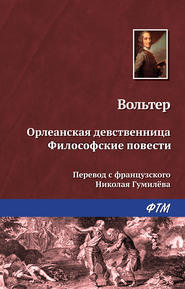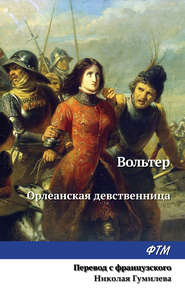По всем вопросам обращайтесь на: info@litportal.ru
(©) 2003-2024.
✖
Micromegas
Настройки чтения
Размер шрифта
Высота строк
Поля
Voltaire
Voltaire
Micromegas
Publisher's preface
Voltaire's lengthy correspondences do not contain anything that might indicate the period in which Micromegas was published. The engraved title of the edition that I believe to be the original displays no date. Abbot Trublet, in his Biography of Fontenelle, does not hesitate to say that Micromegas is directed against Fontenelle; but does not speak of the date of publication. I have therefore retained that given by the Kehl editions: 1752. However there is an edition carrying the date of 1700. Is this date authentic? I would not make this claim; far from it. I have therefore followed the Kehl editions, in which Micromegas is preceded by this warning:
This novel can be seen as an imitation of Gulliver's Travels. It contains many allusions. The dwarf of Saturn is Mr. Fontenelle. Despite his gentleness, his carefulness, his philosophy, all of which should endear him to Mr. Voltaire, he is linked with the enemies of this great man, and appears to share, if not in their hate, at least in their preemptive censures. He was deeply hurt by the role he played in this novel, and perhaps even more so due to the justness, though severe, of the critique; the strong praise given elsewhere in the novel only lends more weight to the rebukes. The words that end this work do not soften the wounds, and the good that is said of the secretary of the academy of Paris does not console Mr. Fontenelle for the ridicule that is permitted to befall the one at the academy of Saturn.
The notes without signature, and those indicated by letters, are written by Voltaire.
The notes signed with a K have been written by the Kehl publishers, Mr. Condorcet and Mr. Decroix. It is impossible to rigorously distinguish between the additions made by these two.
The additions that I have given to the notes of Voltaire or to the notes of the Kehl publishers, are separated from the others by a – , and are, as they are mine, signed by the initial of my name.
BEUCHOT
October 4, 1829.
CHAPTER I
Voyage of an inhabitant of the Sirius star to the planet Saturn
On one of the planets that orbits the star named Sirius there lived a spirited young man, who I had the honor of meeting on the last voyage he made to our little ant hill. He was called Micromegas[1 - From micros, small, and from megas, large. B.], a fitting name for anyone so great. He was eight leagues tall, or 24,000 geometric paces of five feet each.
Certain geometers[2 - This is how the text reads in the first editions. Others, in place of "geometers," put "algebraists." B.], always of use to the public, will immediately take up their pens, and will find that since Mr. Micromegas, inhabitant of the country of Sirius, is 24,000 paces tall, which is equivalent to 20,000 feet, and since we citizens of the earth are hardly five feet tall, and our sphere 9,000 leagues around; they will find, I say, that it is absolutely necessary that the sphere that produced him was 21,600,000 times greater in circumference than our little Earth. Nothing in nature is simpler or more orderly. The sovereign states of Germany or Italy, which one can traverse in a half hour, compared to the empires of Turkey, Moscow, or China, are only feeble reflections of the prodigious differences that nature has placed in all beings.
His excellency's size being as great as I have said, all our sculptors and all our painters will agree without protest that his belt would have been 50,000 feet around, which gives him very good proportions.[3 - I restore this sentence in accordance with the first editions. B.] His nose taking up one third of his attractive face, and his attractive face taking up one seventh of his attractive body, it must be admitted that the nose of the Sirian is 6,333 feet plus a fraction; which is manifest.
As for his mind, it is one of the most cultivated that we have. He knows many things. He invented some of them. He was not even 250 years old when he studied, as is customary, at the most celebrated[4 - In place of "the most celebrated" that one finds in the first edition, subsequent editions read "some jesuit." B.] colleges of his planet, where he managed to figure out by pure willpower more than 50 of Euclid's propositions. That makes 18 more than Blaise Pascal, who, after having figured out 32 while screwing around, according to his sister's reports, later became a fairly mediocre geometer[5 - Pascal became a very great geometer, not in the same class as those that contributed to the progress of science with great discoveries, like Descartes, Newton, but certainly ranked among the geometers, whose works display a genius of the first order. K.] and a very bad metaphysician. Towards his 450th year, near the end of his infancy, he dissected many small insects no more than 100 feet in diameter, which would evade ordinary microscopes. He wrote a very curious book about this, and it gave him some income. The mufti of his country, an extremely ignorant worrywart, found some suspicious, rash[6 - The edition that I believe to be original reads: "rash, smelling heresy." The present text is dated 1756. B.], disagreeable, and heretical propositions in the book, smelled heresy, and pursued it vigorously; it was a matter of finding out whether the substantial form of the fleas of Sirius were of the same nature as those of the snails. Micromegas gave a spirited defense; he brought in some women to testify in his favor; the trial lasted 220 years. Finally the mufti had the book condemned by jurisconsults who had not read it, and the author was ordered not to appear in court for 800 years[7 - Mr. Voltaire had been persecuted by the theatin Boyer for having stated in his Letters on the English that our souls develop at the same time as our organs, just like the souls of animals. K.].
He was thereby dealt the minor affliction of being banished from a court that consisted of nothing but harassment and pettiness. He wrote an amusing song at the expense of the mufti, which the latter hardly noticed; and he took to voyaging from planet to planet in order to develop his heart and mind[8 - See my note, page 110. B. [this note, in Zadig, says: "This line is mostly written at the expense of Rollin, who often employs these expressions in his Treatise on Studies. Voltaire returns to it often: see, in the present volume, chapter I of Micromegas, and in volume XXXIV, chapter XI of The Man of Forty Crowns, chapter IX of The White Bull and volume XI, the second verse of song VIII of The Young Virgin. B."]], as the saying goes. Those that travel only by stage coach or sedan will probably be surprised learn of the carriage of this vessel; for we, on our little pile of mud, can only conceive of that to which we are accustomed. Our voyager was very familiar with the laws of gravity and with all the other attractive and repulsive forces. He utilized them so well that, whether with the help of a ray of sunlight or some comet, he jumped from globe to globe like a bird vaulting itself from branch to branch. He quickly spanned the Milky Way, and I am obliged to report that he never saw, throughout the stars it is made up of, the beautiful empyrean sky that the vicar Derham[9 - English savant, author of Astro-Theology, and several other works that seek to prove the existence of God through detailing the wonders of nature: unfortunately he and his imitators are often mistaken in their explanation of these wonders; they rave about the wisdom that is revealed in a phenomenon, but one soon discovers that the phenomenon is completely different than they supposed; so it is only their own fabrications that give them this impression of wisdom. This fault, common to all works of its type, discredited them. One knows too far in advance that the author will end up admiring whatever he has chosen to discuss.] boasts of having seen at the other end of his telescope. I do not claim that Mr. Derham has poor eyesight, God forbid! But Micromegas was on site, which makes him a reliable witness, and I do not want to contradict anyone. Micromegas, after having toured around, arrived at the planet Saturn. As accustomed as he was to seeing new things, he could not, upon seeing the smallness of the planet and its inhabitants, stop himself from smiling with the superiority that occasionally escapes the wisest of us. For in the end Saturn is hardly nine times bigger than Earth, and the citizens of this country are dwarfs, no more than a thousand fathoms tall, or somewhere around there. He and his men poked fun at them at first, like Italian musicians laughing at the music of Lully when he comes to France. But, as the Sirian had a good heart, he understood very quickly that a thinking being is not necessarily ridiculous just because he is only 6,000 feet tall. He got to know the Saturnians after their shock wore off. He built a strong friendship with the secretary of the academy of Saturn, a spirited man who had not invented anything, to tell the truth, but who understood the inventions of others very well, and who wrote some passable verses and carried out some complicated calculations. I will report here, for the reader's satisfaction, a singular conversation that Micromegas had with the secretary one day.
CHAPTER II
Conversation between the inhabitant of Sirius and that of Saturn
After his excellency laid himself down to rest the secretary approached him.
"You have to admit," said Micromegas, "that nature is extremely varied."
"Yes," said the Saturnian, "nature is like a flower bed wherein the flowers – "
"Ugh!" said the other, "leave off with flower beds."
The secretary began again. "Nature is like an assembly of blonde and brown-haired girls whose jewels – "
"What am I supposed to do with your brown-haired girls?" said the other.
"Then she is like a gallery of paintings whose features – "
"Certainly not!" said the voyager. "I say again that nature is like nature. Why bother looking for comparisons?"
"To please you," replied the Secretary.
"I do not want to be pleased," answered the voyager. "I want to be taught. Tell me how many senses the men of your planet have."
"We only have 72," said the academic, "and we always complain about it. Our imagination surpasses our needs. We find that with our 72 senses, our ring, our five moons, we are too restricted; and in spite of all our curiosity and the fairly large number of passions that result from our 72 senses, we have plenty of time to get bored."
"I believe it," said Micromegas, "for on our planet we have almost 1,000 senses; and yet we still have a kind of vague feeling, a sort of worry, that warns us that there are even more perfect beings. I have traveled a bit; and I have seen mortals that surpass us, some far superior. But I have not seen any that desire only what they truly need, and who need only what they indulge in. Maybe someday I will happen upon a country that lacks nothing; but so far no one has given me any word of a place like that."
The Saturnian and the Sirian proceeded to wear themselves out in speculating; but after a lot of very ingenious and very dubious reasoning, it was necessary to return to the facts.
"How long do you live?" said the Sirian.
"Oh! For a very short time," replied the small man from Saturn.
"Same with us," said the Sirian. "we always complain about it. It must be a universal law of nature."
"Alas! We only live through 500 revolutions around the sun," said the Saturnian. (This translates to about 15,000 years, by our standards.) "You can see yourself that this is to die almost at the moment one is born; our existence is a point, our lifespan an instant, our planet an atom. Hardly do we begin to learn a little when death arrives, before we get any experience. As for me, I do not dare make any plans. I see myself as a drop of water in an immense ocean. I am ashamed, most of all before you, of how ridiculously I figure in this world."
Micromegas replied, "If you were not a philosopher, I would fear burdening you by telling you that our lifespan is 700 times longer than yours; but you know very well when it is necessary to return your body to the elements, and reanimate nature in another form, which we call death. When this moment of metamorphosis comes, to have lived an eternity or to have lived a day amounts to precisely the same thing. I have been to countries where they live a thousand times longer than we do, and they also die. But people everywhere have the good sense to know their role and to thank the Author of nature. He has scattered across this universe a profusion of varieties with a kind of admirable uniformity. For example, all the thinking beings are different, and all resemble one another in the gift of thought and desire. Matter is extended everywhere, but has different properties on each planet. How many diverse properties do you count in yours?"















